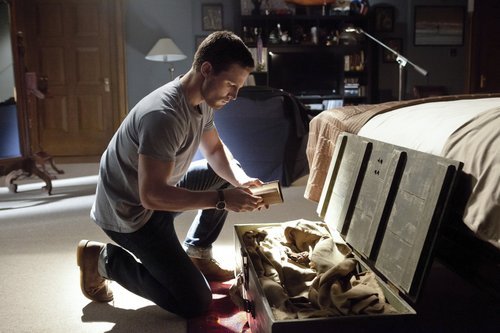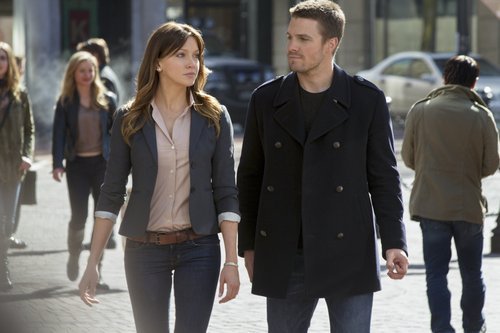Arrow clearly struggles with this checklist of necessities, but before you hurry to assure me that it gets better - I know it does. But as I'm watching and reviewing on a weekly basis, let's go through this one episode at a time.
What I knew about the concept of Arrow was what I had garnered from watching the animated Justice League, where Green Arrow is depicted as a Robin Hood figure whose non-lethal arrows and lack of super-powers informed his role as the voice of reason and restraint for the more god-like members of the League and their ever-growing tendency to step on the little guy in their attempts to catch the big ones.
Damn, now I want to watch the Cadmus Arc again.
Then of course there was his incarnation on Smallville, which introduced the hero just as my interest on the show was on the wane. All I really picked up from that version was a) the “stranded on a deserted island” backstory, b) the millionaire status, and c) abs.
So I knew the basics: the bow and arrows, the Robin Hood imagery, the stint on the deserted island, the romance with Black Canary. But being unfamiliar with his comic book roots, I’m still rather new to the guy who (as I understand it) could fairly be called a second-tier DC hero (right?). I’m just letting you know that I’m a beginner.
 |
| Just like him. |
But he also has to reconnect with the family and friends he’s left behind. And there are plenty: his mother Moira who has pulled a Gertrude and married her husband’s business partner. His little sister Thea, just a child when he left and now a teenager, who dealt with her brother’s absence by turning to drugs. His best friend Tommy who wants to throw Oliver back into the party lifestyle he’s been missing out on for half a decade. And his ex-girlfriend Laurel Lance, now an attorney for a non-profit legal office. She’s also the sister of the very same Sara that was drowned in the boating accident. Turns out that Oliver was cheating on her at the time, and Laurel has a LOT of mixed feelings about his survival.
Going into this show, I only knew a handful of details specific to this particular incarnation of Green Arrow. One of them was that fandom didn’t like Laurel Lance. (As it happens, the only thing I know about Breaking Bad is that fandom hates the main character’s wife Skylar, and the only thing I know about The Walking Dead is that fandom hates the main character’s wife Lori. Just think about the implications of that for a second).
So I knew I had to keep my eye on Laurel. Was fandom’s disdain justified, or was it up to its usual trick of holding female love interests to a ridiculously high double standard? Knowing that she was disliked, would my attitude toward her be biased positively or negatively? With the initials L.L., it very much seemed to me a question of whether she’d end up a Lana Lang or a Lois Lane. And granted, there’s not much I can conclude from a single episode, but I think I can see where fandom is coming from.
You see, Laurel Lance commits the most heinous, terrible, appalling crime that any fictional woman can ever commit.
She isn’t 100% understanding toward the male lead.
Yes, I'm being sarcastic. But only a little bit.
Like I said, this is just the pilot episode and there’s every chance that the writers will mishandle her later down the track. I’m not going to dismiss the collective fan opinion just because I’m sick to death of female characters getting ragged on. Sometimes they are badly written. But as I’ve said many a time before: when a male character is badly written, fandom blames the writers. When a female character is badly written, fandom blames the character (sometimes even the actress). Not always, but you know deep down that it’s generally true.
For now, based on this episode, Laurel’s character felt pretty solid to me, though at the same time I could tell that a few scenes would have rubbed certain viewers the wrong way, simply because they were typical “love interest scenes” that always get flak regardless of how justified they are. For instance, Laurel is depicted as deeply conflicted over Oliver’s re-emergence. And why shouldn’t she be confused over the fact that she had to mourn her sister and boyfriend who died in the midst of cheating on her, only for one of them to return from the dead?
Well, because that’s not what sympathetic female love interests are supposed to do. Nay, it’s not what they’re allowed to do. Character flaws can take many shapes and forms (because otherwise you’re a Mary Sue), but challenging the actions, choices and/or existence of a male lead is strictly forbidden. As soon as she told him “you should have been the one that died”, I knew that she had to hook up with Catelyn Stark and commiserate on what happens when a woman dares to demonstrate their ugly inner thoughts. You know, like actual humans with real weaknesses and stuff.
And I’m going to go out on a limb and assume that Quentin Lance didn’t get nearly as much grief (or in fact, any) when in a grief-stricken bout of fatherly anger and powerlessness, he spat: “did you even try to save her?” to Oliver.
And since disrespecting White Male Lead is regarded as unforgivable, the little things begin to niggle as well. Like, how dare she turn off the TV in her workplace whilst all her other colleges are trying to watch it? (Maybe because she’s deeply uncomfortable with the fact that personal details of her life and her sister’s death are being broadcast). And I don’t even want to know what’s being said about the fact that she’s been casually seeing Tommy during the five year interim, though I’m going to assume that the fact that Oliver was a) declared dead and b) cheating on her, don’t figure much into whatever love triangle shenanigans are on the horizon.
 |
| Laurel Lance: the internet told me to hate her, so I'm doing the complete opposite. |
So we have our basic setup: Oliver is going to go all vigilante as the Green Arrow, armed with his father’s list of names. It’s an interesting switch on the usual hero mandate – that he’s (for the most part) not only punishing villains instead of protecting innocence, but doing it on behalf of someone else. Unlike The Count of Monte Christo, where the great Roaring Rampage of Revenge was totally personal, Ollie is acting on behalf of his father.
Furthermore, there isn’t really an “atonement” angle to what he’s doing. I’m sure he has a bit of guilt regarding Sara’s death, and he’s still got that “spoiled playboy” persona that he wants to shed (but needs as a cover), but for the most part he seems to be motivated by a sense of duty to his father rather than justice.
Miscellaneous Observations:
Was it just me, or was that Slade’s mask with an arrow through it hanging from a stake on the island? I recognised it from the animated Teen Titans.
The acting and dialogue was pretty stilted, but I’m giving the actors/writers the benefit of the doubt and assuming that it’s early-episode nerves. There was so much to establish that there were inevitably going to be some clunky scenes.
One thing I enjoyed about Laurel right off the bat is that her Establishing Character Scene had her passing the Bechdel Test with a fellow female lawyer.
Last time I saw Colin Salmon he was being shot to death in the forest outside Camelot. Nice to see him alive again.
I liked the athleticism of Ollie once he started fighting back against his masked assailants, and most of the action sequences reminded me of the opening to Casino Royale (the one where Bond was chasing that amazingly acrobatic felon). If this is the fighting style that they’re going with then I approve. That leap off the rooftop was pretty impressive.
I approve less over the fact that Ollie actually killed someone, and did so explicitly to keep his silence. Sure, they made sure that the guy in question machine-gunned a harmless chef, but if a hero meters out death like this on a regular basis then things are going to get morally compromised pretty quickly. We now have a hero who has officially committed murder, with very little indication that there are going to be any consequences for it. (Seriously, holding life/death so cheaply in stories such as this is a real bugbear for me. The difference between these two states is the most important thing about our existence, and treating it so flippantly is a sure-fire way to shut down any semblance of emotional realism).
If you absolutely must get rid of someone who knows too much, have them accidentally fall off a rooftop. Clichéd? Sure. But murder is something so massive that if you’re going to introduce it, you have to devote the time to the consequences (the police investigation, the psychological toll, the ethical implications), no matter how superfluous the dead guy is. That’s just me though.
Isn’t setting up headquarters in an abandoned warehouse a bit of a risk? Anyone looking for shelter for the night could break their way in. And he’s going to store expensive computer equipment in there?
Hopefully Ollie’s morose voiceovers aren’t going to last (oy, remember the tedious nonsense of the voiceovers in Grey’s Anatomy and Heroes? They’re just NOT a good idea), but I have to admit laughing when he stood in front of the mirror and stated: “the face I see the in mirror is a stranger” whilst he was staring down at his own abs.
 |
| Even HE'S checking himself out. |

No comments:
Post a Comment